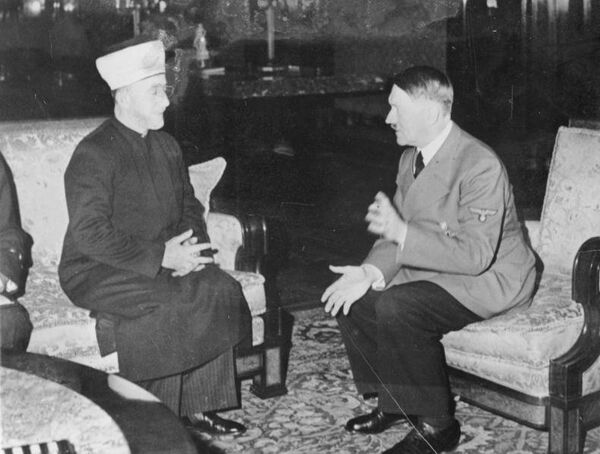The magazine has provided a review of David Motadel’s "Islam and Nazi Germany’s War” and Stefan Ihrig’s "Atatürk in the Nazi Imagination."
Both books recount of Hitler’s fascination with Islam and the attempts of the Nazis to use Muslims in their fight against their enemies, be it Britain or the Soviet Union.
The books recall in detail how Hitler and his close circle toyed with the idea of using Islam instrumentally in their war strategy, subtlety drawing parallels with the current strategy now employed by Washington.
"Neither Motadel nor Ihrig claims to provide connections to current politics or conflict in the Middle East," the review reads. "That is appropriate, given the character of their scholarship," the article reads.
"And yet, during the latest American-led “great Jihad of Freedom" in Iraq and Syria, aimed at suppressing the Islamic State of Iraq and al-Sham, both volumes have implications for understanding current history.”
"Motadel in particular offers a portrait of continuity in the West’s strategies for mobilizing Islam in wartime or for using Islam for its geopolitical ends —a history, on the whole, of continual failure."
"Such propaganda may seem absurd today,” writes David Motadel in his comprehensive and discerning history.
“And yet one need only review the awkward, cartoonish texts of American propaganda pamphlets dropped on Afghanistan before the US-led invasion of that country in 2001 or the similarly naive pamphlets dropped on Iraq before the US-led invasion to oust Saddam Hussein in 2003 to recognize that the history of ill-considered Western hypotheses about how to mobilize or co-opt Muslim populations during expeditionary warfare is a long one."
"Nazi strategy left another legacy: it suggested a model for the United States during the cold war. In partnership with Saudi Arabia after the war, American strategists considered how a mobilized Islam might counter Soviet expansion in the Middle East," the review adds.

The analysis however concludes that Nazi alliances with Islam, which should be understood as primarily instrumental, not ideological, failed to disguise Germany’s own self-interests.
"The Muslim world was far too heterogeneous to respond to a single blueprint for revolt, and in any event, it was all too clear that Muslims were being employed for the strategic purposes of the Central Powers, not for a truly religious cause."
Still, as in Berlin between the wars, failure has proven no deterrent to the persistence of Washington, where Pentagon planners continue to act as if they can win wars in the Middle East by deftly manipulating and arming tribes, sects, and Islamic leaders in scattered territories they barely know, the magazine says.
Motadel’s sophisticated narrative suggests at least two reasons why such Western strategies typically fail.
One is the planners’ ignorance of Islam’s diversity and of the subtle part that faith plays in the daily lives of so many self-identified Muslims, particularly, that Westerners often overestimate Islam’s coherence and thus its pliability.
The second reason is written across the vast history of colonial and postcolonial European and American interventions in Muslim territories, from the two world wars to the three Gulf wars and now to the campaign against the Islamic State.
Muslim populations called to arms by Washington, London, or Berlin on the grounds of common enemies and common interests have heard it all before.
They have seen countless promises betrayed and one traumatic outcome of Western intervention after another. It is little wonder that so many find the summons to form an alliance unconvincing.





